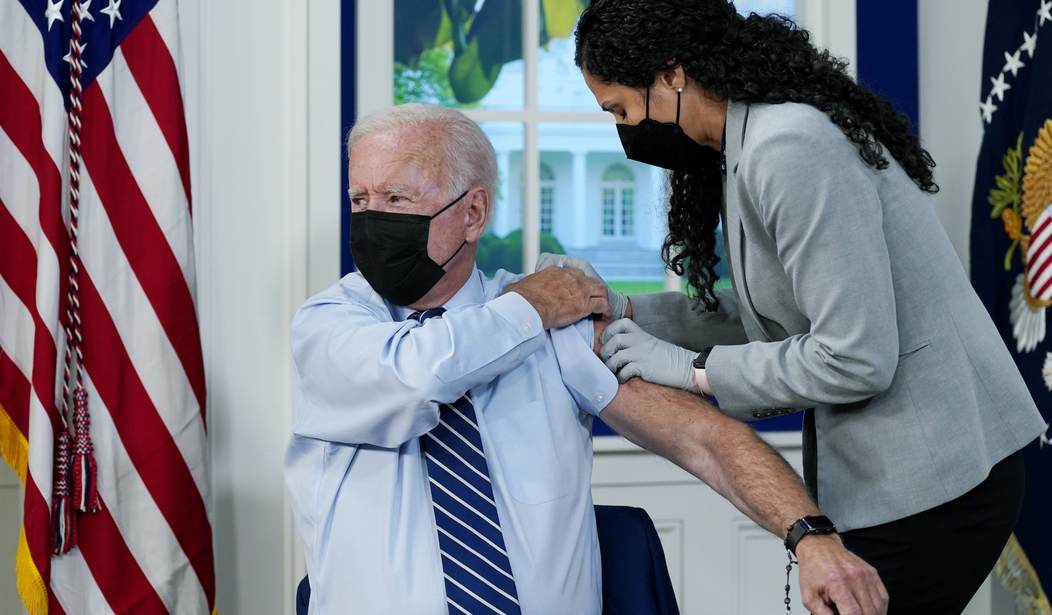This news doesn’t appear to be any sort of signal that OSHA is bailing out on President Joe Biden or even the agency’s own limits of authority, at least not thus far. It’s mostly an acknowledgment that the courts have gotten heavily involved in the question of Biden’s vaccine mandate covering the private sector and the outcome is far from assured. That’s probably what led them to post a new notice on their page covering the COVID Vaccine Emergency Temporary Standard (ETS) yesterday saying that they had “suspended activities” in terms of implementing and enforcing the ETS until litigation was complete. On the plus side, OSHA does appear to be doing something that Joe Biden has thus far not done. They are recognizing that the President’s authority to take such actions impacting the decisions of the individual states and their private citizens is not infinite and the judicial branch may still end up having something to say about it. (National Review)
The Occupational Safety and Health Administration has suspended implementation and enforcement of the Biden administration’s vaccine mandate for private employers after a federal court blocked the measure.
The OSHA website page dedicated to the COVID Vaccine Emergency Temporary Standard (ETS) reads: “While OSHA remains confident in its authority to protect workers in emergencies, OSHA has suspended activities related to the implementation and enforcement of the ETS pending future developments in the litigation.”
Last week, the U.S. Court of Appeals for the Fifth Circuit fully blocked Biden’s executive order requiring companies with over 100 workers to mandate vaccination for their employees after temporarily staying it on November 12.
That recognition of the authority of the courts I mentioned above is reflected in the language of both OSHA’s notification and actions already taken by the courts. Keep in mind that when the 5th Circuit put the brakes on the mandate, the court didn’t demand any actions by the President directly. The directive from the court was aimed squarely and specifically at OSHA, directing the agency to “take no steps to implement or enforce the mandate until further court order.”
Also of interest in the OSHA statement is the preface saying that the agency “remains confident in its authority to protect workers in emergencies.” As Caroline Downey points out at National Review, it may be growing increasingly difficult to convince a judge that a true state of emergency exists. The legislation underpinning the ETS specifically says that such actions are only allowed “when employees are exposed to a ‘grave danger’ that necessitates immediate action.”
How grave is the danger to workers at the moment? Granted, before we had any vaccines and when intensive care beds in hospitals were scarce, sending workers into crowded conditions certainly could have led to grave consequences. But with monoclonal antibody therapy now being available, as well as a new anti-viral pill from Pfizer close to receiving emergency approval from the FDA, people who test positive for the virus have more options, just as they do if they come down with the flu. On top of that, even vaccinated people are currently not only showing up with positive tests but also being able to spread the disease themselves, so the “remedy” that OSHA is seeking to mandate may not prove to be all that effective.
Another problematic portion of the mandate that doesn’t receive as much attention is the fact that it’s limited to employers who have more than 100 employees. That actually creates two potential problems for OSHA. First, even if we assume that the mandate is both legal and effective, what of all of the workers in the country who are employed by small businesses? They’re being hung out to dry. And the people who wind up being fired from larger corporations because they refuse to comply will obviously seek new employment with smaller companies where the mandate won’t be in effect. In that event, the ETS is really just creating more of a potential “threat” for workers at small companies.
On top of all that, even Joe Biden himself recognized from the beginning that the mandate may prove to be unconstitutional. While not impossible, this federal vaccination mandate covering the private sector was always something of a Hail Mary pass. That leaves OSHA in the spotlight, standing in a rhetorical liferaft that may be taking on water.
Once the 6th Circuit gets done with this question (and likely the Supreme Court as well), we’ll have a better idea of where things stand. But if that lasts into 2022, by that time there may be enough treatment options available that the mandate will be rendered moot in the eyes of the courts. And if that’s the case, Joe Biden will once again be left with egg on his face after another of his signature initiatives falls into the dustbin of history.








Join the conversation as a VIP Member